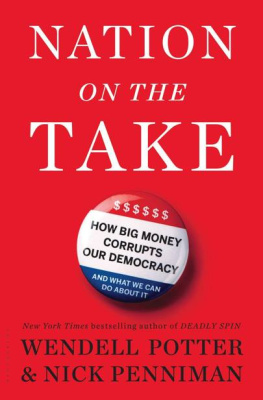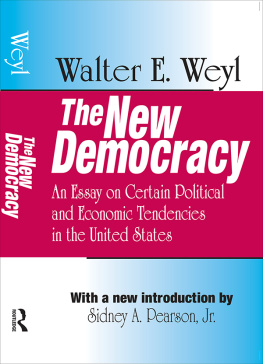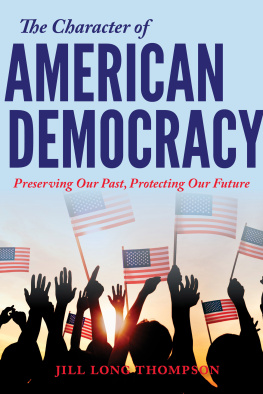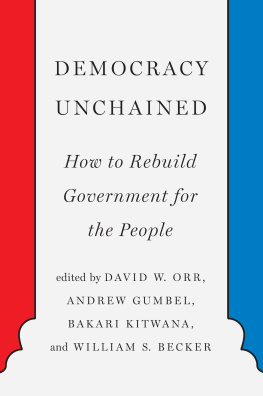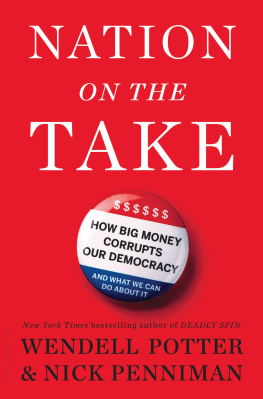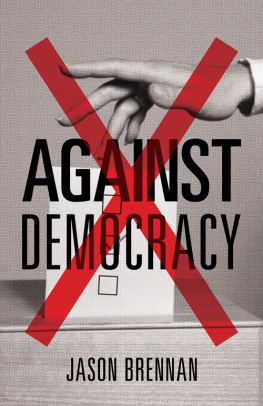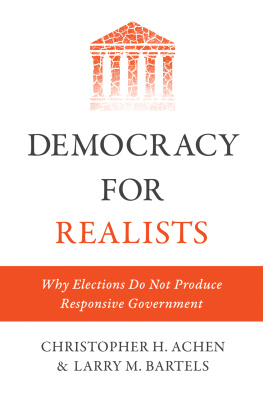To our dear families, and the country we all love.
And in loving memory of Emily Jacqueline Potter.
BOOKS BY WENDELL POTTER
Deadly Spin: An Insurance Company Insider Speaks Out on How
Corporate PR Is Killing Health Care and Deceiving Americans
Obamacare: Whats in It for Me?

Contents
We were drawn to collaborate on this book out of a common sense of love and heartbreak. Love for our country, heartbreak for what is happening to it. We suspect that most people feel the same way, perhaps many for the same reasons.
Our grand 240-year-old project of self-government has been derailed, replaced by a coin-operated system that mainly favors those who can pay to play.
This is not what our American predecessors bled for, not just during the Revolution but during other wars, as well as during many moments of protest and resistance.
We hope Nation on the Take will be seen as the most comprehensive guide to this critical issue for years to come. Part 1 presents the big picture and traces the history of the problem. Part 2 connects the dots to show how the hijacking of policy and politics has significant downstream effects on us all. Then part 3 discusses solutions and how to encourage a new kind of movement to get those solutions passed into laws.
Throughout, we provide graphs and charts and believe that weve written in a way that avoids esoteric references. We have set out to explain and expose this crucial problem in straightforward terms, to revive our imaginations about what our democratic republic can be, and to describe how we can all come together to renew it. In this era of intense political polarization, doing so may serve to bring us together in surprisingly powerful ways.
Both of us have reported on government and politics at different times in our careers. As a young reporter in Washington, D.C., during the 1970s, Wendell covered national politics when Gerald Ford and Jimmy Carter were in the White House and congressional leaders included Senate Minority Leader Howard Baker from Wendells home state of Tennessee. It was a time when there were far fewer lobbyists on Capitol Hill and when the vast majority of campaign contributions came from people who could actually vote for the candidates they supported. Political Action Committees existed but played relatively minor roles. There was no such thing as a super PAC. Corporations were not considered people, and millionaires and billionaires contributed relatively little to campaigns.
Wendells longer career, after he left Scripps-Howards Washington bureau, was in corporate public affairs. Among his responsibilities at Cigna, where he served as head of corporate communications until he left in 2008, was administering the companys PAC and coordinating efforts with the industrys lobbyists. He had firsthand knowledge of how huge corporations had become political power brokers and how they were able to deploy cash very strategically to influence both elections and public policy with the goals of rigging the rules for their own self-interests.
When Wendell left his job after a crisis of conscience, which was described in his first book, Deadly Spin, he played a key role in the debate to reform the U.S. health care system, testifying before several congressional committees. During one hearing he told lawmakers that if they caved to pressure from insurance industry lobbyists they might as well call their bill, The Health Insurance Industry Profit Protection and Enhancement Act.
It turned out to be a prescient warning. As Wendell has written in his columns for numerous media outlets, among the biggest winners after the reform dust had settled were insurance companies. The share prices of the largest investor-owned insurers have more than tripledand in some cases have more than quadrupledsince President Obama signed the Affordable Care Act into law in 2010.
Its not that the sponsors of the reform law wanted to kowtow to the special interests. They had no choice. Legislators knew that even modest reforms could not be enacted unless they had first made certain that their bill would get a thumbs-up from the corporate and trade-association lobbyists.
That remarkable ability for a small group of people to bend the levers of power is what drew Nick to this cause, too. For more than a decade, working as a journalist and magazine publisher in D.C., Nick saw how great ideas never got a hearing, not because they lacked public support, but because they lacked the support of well-financed special interests. We, the people, he concluded, know how to fix many of the problems before us; we just dont have the power to do what we know.
Most recently, he helped launch an investigative reporting project that focused on the aftermath of the financial meltdown and the battle inside Washington to rein in Wall Street. Witnessing the failed attempts by good people to create a stable and sane financial system was akin to the profound frustration that many recovering stroke victims must feel: the ideas and desires are in the head, but its nearly impossible to move the mouth or limbs.
Its time to end the paralysis, not just for the sake of legislating solutions, but also for the sake of reviving our faith in this remarkable country.
We believe we have written a book grounded in common sense and fueled by a sense of patriotism. We hope youll find it not just useful but energizing.
America is a dream.
The poet says it was promises.
The people say it is promisesthat will come true.
LANGSTON HUGHES, FREEDOMS PLOW
Our country is indeed a dreama dream created during a period of time known as the American Enlightenment, which came to a focal point during the American Revolution and lasted until the early nineteenth century.
The leading political thinkers of the day were the ones we know so well: Thomas Jefferson, John Adams, James Madison, Thomas Paine, George Mason, Alexander Hamilton, Benjamin Franklin. Their dream was to create a democratic republic, in which ultimate power rested with the citizens. Just after the Declaration of Independence asserts the unalienable rights to life, liberty and the pursuit of happiness, it states:
That to secure these rights, governments are instituted among Men, deriving their just powers from the consent of the governed, That whenever any Form of Government becomes destructive of these ends, it is the Right of the People to alter or to abolish it, and to institute new Government, laying its foundation on such principles and organizing its powers in such form, as to them shall seem most likely to effect their Safety and Happiness.
They knew that self-government would be messy and inefficient at times, but they had faith that common ground would be regularly found and that people would slowly but surely build a better nation together. As Jefferson said: Sometimes it is said that man cannot be trusted with the government of himself. Can he, then, be trusted with the government of others? Or have we found angels in the form of kings to govern him? Let history answer this question.
In addition to the Declaration of Independence, the Constitution of the Commonwealth of Massachusetts is a shining example of the idealism that defined the era. Ratified in 1780, it is thought to be the worlds oldest still-functioning written constitution. Drafted in part by John Adams, it inspired and informed the U.S. Constitution, forged seven years later. Part I, Article VII, of the Massachusetts charter reads: Government is instituted for the common good; for the protection, safety, prosperity, and happiness of the people; and not for the profit, honor, or private interest of any one man, family, or class of men; therefore, the people alone have an incontestable, unalienable, and indefeasible right to institute government; and to reform, alter, or totally change the same, when their protection, safety, prosperity, and happiness require it.
Next page
